- Home
- Shirley Jackson
The Sundial Page 3
The Sundial Read online
Page 3
“Young man to catalogue the library,” Essex supplied.
“Mr. Halloran,” Miss Ogilvie asked, “may I get you a shawl to throw over your shoulders? Perhaps your back is cold? I know one’s back so often is, even when the fire is warming one’s . . .” she hesitated, “extremities,” she said.
“Do you mean feet, Miss Ogilvie?” Mrs. Halloran asked. “Because I assure you that Richard still has his, although they are not often visible. Miss Ogilvie is concerned about your feet,” she said down to her husband.
“My feet?” He smiled. “Don’t do much walking any more,” he explained gallantly to Miss Ogilvie, who blushed.
“Aunt Fanny,” Mrs. Halloran said, and they all turned to her, wondering at her voice, “I am happy to hear that you ask for nothing at my hands, because there is something I am going to tell all of you, and Aunt Fanny reassures me.”
“I?” said Aunt Fanny, astonished.
“The essence of life,” said Mrs. Halloran gently, “is change, you will all, being intelligent people, agree. Our one recent change—I refer, of course, to the departure of Lionel—”
“It was Lionel, then,” Mr. Halloran said, nodding to himself before the fire.
“—has been both refreshing and agreeable. We could very well do without Lionel. I am now convinced that a thorough housecleaning is necessary. Richard will stay, of course.” She put her hand on her husband’s shoulder and he nodded again, gratified. “Essex,” said Mrs. Halloran. “I wonder if we have not detained you past your time?”
“The library—” said Essex, putting his fingers against his mouth and staring.
“I think I shall let the library go for a while,” Mrs. Halloran said, “and get someone to paint murals in my dressing-room. You will, of course, receive a small settlement to start you on some small scholarly pursuit.”
“The path,” Essex said tightly, “gets narrower all the time.”
“So wise of you,” Mrs. Halloran said.
“I would have hoped—” Essex tried. “I would hope that after—”
“Essex, you are thirty-two years old. It is not too late for you to find a career in life. You might work with your hands. You may of course take a day or so to plan. Miss Ogilvie,” and Miss Ogilvie put out her hand blindly and took hold of her chair arm. “I am pleased with you,” Mrs. Halloran said. “This is not criticism, Miss Ogilvie. You are a gentlewoman, of a sort too rarely found in the world today; you have been sheltered—you came, I think, just shortly before Fancy was born?—you have been sheltered from the world all your life, and I would not thoughtlessly put you out to live exposed. I think we shall put you into a little boarding house, genteel, of course—you may be positive that it will be genteel, and altogether suitable for your condition of life and your breeding; some watering place? A spot by the sea? In the off season you will play cribbage with other ladies of similar station in life. Perhaps during some warm autumn month you will fall into the hands of an adventurer, carried away by the sound of the sea and the fading merriment on the pier; perhaps even Essex, in his trackless scholarly wanderings, will find you and take your money away from you. You would of course be perfectly safe in the hands of an ordinary adventurer, since the little nest egg I will give you will be absolutely out of your control; I feel that it is only wise.”
“This is heartless.” Miss Ogilvie sank back in her chair. “I have not deserved this.”
“Perhaps not. But you must allow me my impulse of generosity. I insist upon the nest egg.”
“And I? Am I to be turned out, too?”
“Dear Aunt Fanny, this is your home. Do you suppose me ungrateful enough to turn you away from the home of your childhood? You have lived here with your mother, with your father—a fine man; I remember your father.”
“My mother and father have nothing to do with you. My brother—”
“Yes,” said Mrs. Halloran. “You went to your first, and only, dance, in the ballroom here; Miss Halloran, you were then; we must not lose sight of Miss Halloran in Aunt Fanny. Equally, however, your brother and I are alone now; we have not been alone in this house since our marriage. There is room enough for you and me in the house, Fanny,” Mrs. Halloran said indulgently.
“I have never thought so,” Aunt Fanny said.
“Do you recall the tower, Fanny? Your father built it; it was to have been an observatory, was it not? I remember workmen there during my early days in the house. The tower could be made extremely comfortable. You may even take some of my furniture up there; I have no objection to your choosing anything in the house, except, of course, those objects of particular sentimental value; the blue cloisonné vase in the hall will go with Miss Ogilvie.”
“I will take my mother’s jewelry.”
“I daresay that people in this house years from now will begin to talk of the haunted tower.” Mrs. Halloran laughed. “Well,” she said, “who is left now? It will be lonely here for Maryjane, I know; I am positive that she had a genuine feeling for Lionel, although I would not care to define it any further than that. I think I shall send Maryjane home again. Lionel found her in a public library in the city, so that is where she is going. She had a little apartment at the time, and I shall arrange for her to have her little apartment back again. She will not absolutely have to go back to work in the library, because of course I will be generous. She may even take up again with her old friends as though no time had passed; I am afraid, however, that she must not hope to find a second Lionel. One Lionel in a lifetime is, I believe, quite enough for anyone.”
“And Fancy?” said Miss Ogilvie, barely speaking. “I am her governess, I should—”
“Fancy is mine, too, now,” Mrs. Halloran said, smiling. “Some day everything I have will belong to Fancy, and I think to keep Fancy with me.”
“I think you’ve been joking with us,” Essex said, his voice flat, and without life. “It’s one of your jokes, Orianna. You want us all to be frightened, and beg, and then you will laugh and say you were joking—”
“Do you really think so, Essex? Then I will be interested to see how far my joke will go before you beg. Richard?” Mr. Halloran opened his eyes and smiled. “Bedtime,” he said cheerfully. Mrs. Halloran turned the wheel chair. “Goodnight,” she said; “Goodnight,” Mr. Halloran said, and Mrs. Halloran had pushed the wheel chair almost to the door before Essex ran to open it for her.
_____
Miss Ogilvie was crying, not noisily, but obtrusively; she had cried slightly when Lionel died, but her tears then had been more formal, and she had kept her nose from turning red. Aunt Fanny sat in patient grimness, staring into the fire. Her hands were folded in her lap; when her brother and sister-in-law left the room Aunt Fanny had said “Goodnight, Richard,” and had not spoken since. Essex walked, because when he was still he saw himself; “Cringing,” he said, “fetching and lying and spying and outraging, and turned away as I deserve. Aunt Fanny,” he said, “Miss Ogilvie—we are contemptible.”
“I always tried to do what was best,” Miss Ogilvie said miserably. “She had no right to speak to me so.”
“It was true,” Essex said. “I was shallowly protected; I thought I was clever and quick and invulnerable, and that is not a very good protection; I thought she was fond of me, and I made myself into a pet monkey.”
“She could have broken it more gently,” Miss Ogilvie said.
“An ape, a grotesque little monster.”
“Be quiet,” said Aunt Fanny, and they turned to her, surprised. She was looking toward the door; it opened, and Fancy slipped in.
“Fancy,” said Aunt Fanny, “your grandfather would not like you to be downstairs so late. Go at once to your room.”
Disregarding Aunt Fanny utterly, Fancy moved to the fireplace and sat crosslegged on the hearth rug. “I spend a lot of time in here,” she said. “When you’re all in bed, mostly.” She looked directly at Miss Og
ilvie. “You snore,” she said.
Miss Ogilvie, goaded, almost snarled. “You ought to be spanked,” she said.
Fancy ran her hand richly along the soft hearth rug. “It’s going to belong to me when my grandmother dies,” she said. “When my grandmother dies, no one can stop the house and everything from being mine.”
“Your grandfather—” Aunt Fanny said. “My brother—”
“Well,” said Fancy, as one explaining to an unreasonable child, “of course I know that it really belongs to Grandfather. Because it belongs to the Hallorans. But it doesn’t really seem to, does it? Sometimes I wish my grandmother would die.”
“Little beast,” said Essex.
“This is not properly spoken, Fancy,” Miss Ogilvie said gravely. “It is very rude of you to think about your grandmother’s dying, when she has been so kind to you. And it is very rude to steal about the house at night spying on people and then making comments on—” She hesitated. “You ought to behave better,” she said.
“Furthermore,” said Aunt Fanny, “you had better not count your riches before you get them. You have plenty of toys.”
“I have my doll house,” Fancy said suddenly, looking for the first time squarely at Aunt Fanny. “I have my beautiful little doll house with real doorknobs and electric lights and the little stove that really works and the running water in the bathtubs.”
“You are a fortunate child,” Miss Ogilvie said.
“And all the little dolls. One of them,” Fancy giggled, “is lying in the little bathtub with the water really running. They’re little doll house dolls. They fit exactly into the chairs and the beds. They have little dishes. When I put them to bed they have to go to bed. When my grandmother dies all this is going to belong to me.”
“And where would we be then?” Essex asked softly. “Fancy?”
Fancy smiled at him. “When my grandmother dies,” she said, “I am going to smash my doll house. I won’t need it any more.”
_____
Essex lay absolutely still in the dark, thinking that if no sound or movement could be heard outside the door he would be safe; always, when he held himself this still he hoped that he might be really dead.
“Essex,” Aunt Fanny whispered, tapping softly, “Essex, please let me in?”
At first, sometimes, Essex had tried to answer her. “Go away, Aunt Fanny,” he would say; “Aunt Fanny, go away from here.” Now, however, he knew that he was safer if he did not speak or move; he might even be dead.
“Essex—I’m only forty-eight years old. Essex?”
I am enclosed in the tight impersonal weight of a coffin, Essex thought; there is thick earth above me.
“Orianna is older than I am. Essex?”
I cannot turn, cannot move my head; if my eyes are open I do not know it; I dare not move my hand to feel the holding wood around me.
“Essex? Essex?”
I will try to speak into the deafening silence; I will try to move and turn my head and raise my hands and I will be held tight, tight.
“Let me in, Essex—you can stay on in the house with me.”
_____
It was very early in the morning, so early that there was no clear light. On the terrace and on the long lawn it was dark, and only a certain knowledge that the sun rose every morning could give any hint of brightness. Aunt Fanny, who had sat all night inside her dead mother’s bedroom, and Fancy, who had awakened and stolen softly away from her sleeping mother, met and startled one another on the terrace. At first each of them saw only a dark figure, and then Aunt Fanny said “Fancy?” whispering, “what are you doing out here?”
“I was playing,” Fancy said evasively.
“Playing? At this hour?” Aunt Fanny took Fancy’s hand and led her down the terrace steps. “Come away from the house, Fancy; we’ll go into the gardens. What were you playing?”
Fancy smiled provokingly. “Just playing,” she said.
“Who told you all of this would belong to you someday?” Aunt Fanny asked suddenly, stopping her walk to stand and look down at Fancy. “Your mother? It must have been. I suppose your mother thinks she has a claim. Let’s walk down the side path, dear; Aunt Fanny likes the secret garden early in the morning. Now, a little girl ten years old with a mother and a grandfather and an Aunt Fanny to look after her shouldn’t be always thinking about what she is going to get someday. We all love you, you know that? Aunt Fanny loves you.”
It was almost too dark to see the path, but Aunt Fanny could see Fancy’s face turned to her, curiously. She does not have the family charm, Aunt Fanny thought, and sighed. Then Aunt Fanny stumbled, and thought, perhaps it is still too dark to go down these side paths, but now it was as far to go back as to go on. Looking upward, to see if it was getting any lighter, Aunt Fanny made small sounds of irritation. The gardeners were growing careless with these walks far from the house; perhaps they knew that only Aunt Fanny habitually came along these ways, because the hedges beside the path had not been clipped smooth, making a straight green wall on either side; indeed, when Aunt Fanny looked up she could see that the hedges had been allowed to grow almost wild; were, in fact, in some places meeting overhead, darkening the path and giving an air of gloom to a walk which should have been agreeable and refreshing. “My father,” Aunt Fanny said aloud, “would not have tolerated this; Fancy, look there: the turnings of this walk should be perfect, lending themselves to a gentle easy saunter, and here we are slapped and confused. I wish,” Aunt Fanny said, “that my father could see what has been done to the gardens.”
“There’s a gardener,” Fancy said.
It was not until that moment, Aunt Fanny thought, that the faint depression she had been feeling deepened and centered and became conscious; walking in the gardens had always made Aunt Fanny feel happy, but when Fancy pointed out the gardener Aunt Fanny at the same time recognized that they had somehow strayed off the side path and were lost, perhaps even wandering onto someone else’s property, although, as she told herself at once, they had not gone through the wall so it was really all right; certainly they had not been gone ten minutes from the house, and the Halloran property did not end ten minutes from the house in any direction.
“Fancy,” she said uneasily, “I really think we had better go back,” but Fancy had run on ahead. There was light now, of a sort, but it was growing misty, and, with the green branches now reaching most frighteningly over her head and the faint touches of mist curling around the tips of leaves and through the branches and even almost hiding Fancy’s feet as she ran, Aunt Fanny became, quickly and most pressingly, nervous, and, worse, bewildered. “Fancy,” she called, “come back at once,” but Fancy, as in a dream, ran on, always too far ahead to catch, running ankle deep through the mist, turning and even laughing as she ran ahead between the hedges; “Fancy,” Aunt Fanny called, hurrying, “come back.”
Then she too saw the gardener; he was standing on a ladder some distance down the path, and he was clipping the hedge. Aunt Fanny was perplexed, wondering how Fancy could have seen him before, so far back among the twisting curves of the path, but Fancy was running to him now, laughing, and Aunt Fanny, gasping, hurried on. Fancy caught the bottom of the gardener’s ladder and spoke to him, laughing, and the gardener turned and looked down at her and nodded and pointed. When Aunt Fanny came up he turned back to the hedge and raised his clipper again. “Fancy,” Aunt Fanny said, pulling at her, “come away at once. We do not run and laugh before the gardeners,” she said severely but softly, “Fancy, we always observe decorum; I am displeased that you should have run away from me.”
“I wanted to ask him the way,” Fancy said. She was walking quietly now, her cheeks faintly flushed from running. “Didn’t you think he was funny?”
“I hardly noticed, Fancy. One does not—”
“Dressed funny, I mean? And his hat?”
“I said, Fancy, I do not—�
�
“Look at him, then.” Fancy stopped, and shook at Aunt Fanny. “Look and see how funny he is.”
“Look back on a gardener? I?” Aunt Fanny gave Fancy an irritable little pull. “Fancy, behave yourself.”
“He’s gone now, anyway.” Fancy moved slightly ahead and then said, “Why, here’s the garden; I didn’t know we were so near it.” She moved between the arching branches overhead, the mist moving around her ankles, and Aunt Fanny, annoyed and frightened and tired, hurried to keep up with her; it would not do to let Fancy stray too far. A little girl and a defenseless woman, Aunt Fanny thought with sudden acute fear; strange gardeners around (and there had been something funny, Fancy was right—was it the turn of his head?), and neither of them sure of the way back.
“Please wait, Fancy,” she called, and followed, into the garden, and stopped. This was not her secret garden, this was not the garden which ought to have been at the end of the path they had taken, this was a garden so secret that Aunt Fanny wondered, shocked, if anyone had ever seen it before. Fancy, half-hidden in the mist, was dancing on the grass, and there were flowers, dull in the mist, but showing sullenly red and yellow and orange. Distantly, clouded, Aunt Fanny saw the hard whiteness of marble, and then through a break in the mist a narrow marble pillar. “Fancy,” she cried out, moving forward and holding her hands guardingly before her, “where are you?”
“Here,” Fancy called back.
“Where?”
“In the house.”
The voice died away and Aunt Fanny, tangled in mist now, began to cry helplessly. “Fancy,” she said.
“Aunt Fanny,” but it came from far away.
Stumbling, Aunt Fanny went forward, hands out, and touched marble, but it was warm and she took her hand away quickly; hideous, she thought, it’s been in the sun. Then she thought, why, this could be the summer house and I am only turned around; we could have strayed from the path and come into the garden by another way and that would be why it looked strange; this is certainly the summer house and it is silly of me to cry and stumble and be frightened. I shall go into the summer house, she thought, and sit down quietly on the bench, and when I have recovered myself I shall either call until Fancy finds her way to me—the wicked girl, to run away so—or I shall wait until this mist clears a little—and it must, of course; it is an early morning mist, a trifle; the sun will sweep it away; I have been in fogs many times worse than this and never been frightened; it was only because it was unexpected; I shall sit in the summer house until I am able to go on.

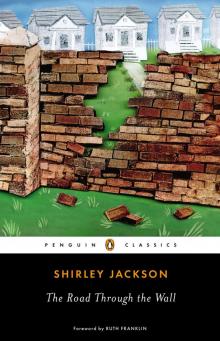 The Road Through the Wall
The Road Through the Wall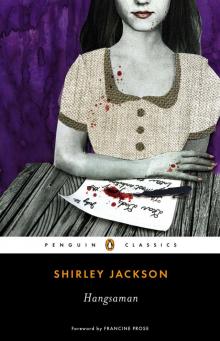 Hangsaman
Hangsaman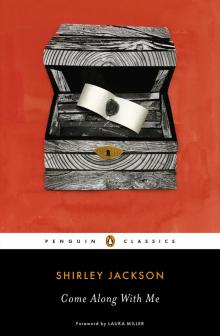 Come Along With Me
Come Along With Me The Lottery
The Lottery Just an Ordinary Day: Stories
Just an Ordinary Day: Stories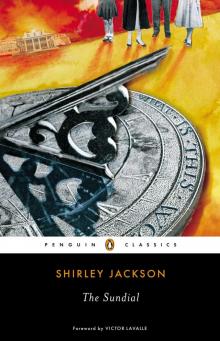 The Sundial
The Sundial Dark Tales
Dark Tales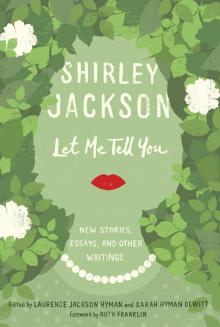 Let Me Tell You: New Stories, Essays, and Other Writings
Let Me Tell You: New Stories, Essays, and Other Writings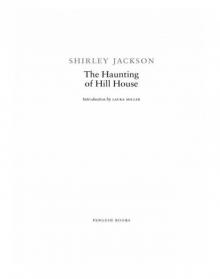 The Haunting of Hill House
The Haunting of Hill House The Bird's Nest
The Bird's Nest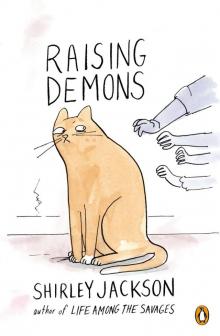 Raising Demons
Raising Demons We Have Always Lived in the Castle
We Have Always Lived in the Castle The Letters of Shirley Jackson
The Letters of Shirley Jackson The Missing Girl
The Missing Girl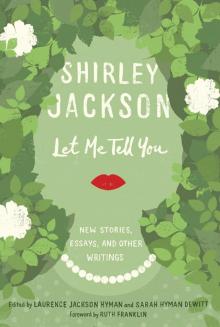 Let Me Tell You
Let Me Tell You